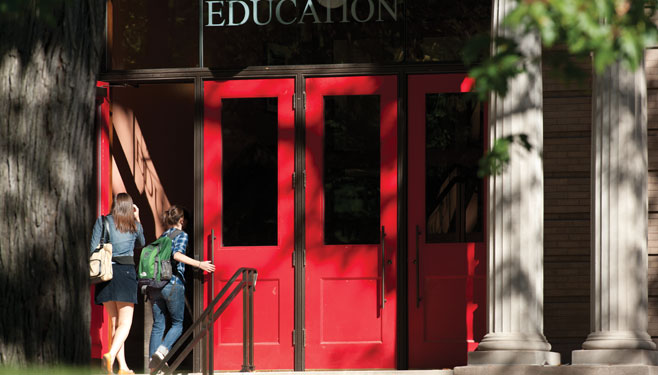
When it comes to annual giving, the School of Education’s Board of Visitors (BOV) earns a perfect score. One hundred percent of the 17 members committed to make gifts to the School’s annual fund – a unique feat among the University of Wisconsin-Madison’s school and college boards of visitors.
“Let’s face it, the university needs money,” board member Ron Schwarz (‘77 BSE EDU) said. He expects to see even less state funding in the future, and he believes flexibility is important for the dean. “So much money is predetermined,” he said. “I think it’s really important she has some leeway.”
“I am so proud of my colleagues,” Board President Marlene Hartzman (‘70 BSE EDU) said. “Everybody has made a commitment.” The alternative – long-term instability to key programs – wasn’t a choice, she added. “Even a school of this stature was going to lose some important functions. You’re faced with this downward spiral, and we thought this was unacceptable.”
Dean Julie Underwood called the board’s giving an incredible model for other alumni. By showing their trust and support of the School, they encourage other alumni to also make annual gifts, she said. “Trust is contagious.”
Boards of Visitors across campus were asked to make leadership annual gifts in advance of this fall’s Share the Wonderful annual campaign. In a changed economic climate, annual gifts ensure UW-Madison can provide exceptional educational experiences for students. BOV members also sent notes and made telephone calls to increase awareness and discuss the consequences of less funding.
“It’s important for everyone to give back. Why wouldn’t we want to provide the same level (of excellence) for future generations?”
Nancy Torres,
Board of Visitors member,
School of Education
The BOV’s 100 percent commitment to annual giving began with a discussion about the board’s mission and a question: “If we’re here to support the School and the dean, how do we do that?” Board members talked about what the School gave them, and how their lives are so different because of what they gained. Visiting with professors brought home the School’s positive impact in the world. Many members, including Hartzman, only made gifts to specific projects and programs but had shied away from giving to the unrestricted annual fund. Once they examined the fiscal situation, they concluded “there’s an undeniable, critical need for flexible funds,” Hartzman said. “Once you start to see the consequences of not doing it, then the choices become more clear.”
Allowing the dean to decide how to use her gifts makes sense for emerita board member Nancy Torres (‘81 BSE EDU). “Who better to make the decisions about how to spend the money than the person running the program? It’s a very good program, and they are successful – so they make good decisions.” The well-respected School includes eight programs that are ranked among the top three in the nation. “It’s my job to keep them that way,” Underwood said. “I cannot do that without the support of alumni.”
The annual fund gives Underwood flexibility to recruit and retain top faculty to sustain the School’s excellence. The School especially uses annual gifts to support external relations and communications, allowing it to stay in touch with faculty and students. Communicating the good work the School is doing and connecting with alumni is huge, Hartzman said.
Schwarz, who lives in Dallas, Texas, gives to the School because he’s in awe of what goes on at the university and in education, including the research and the programs that go far beyond teaching teachers to teach. “The other reason is, I went to Wisconsin. I love that place, and I want to support it because I love it. Torres also said the university is part of who she is, adding everyone in her Alameda, California, community knows she’s a UW-Madison alumna and Packers’ fan. “I got a great education, but I also see it as part of my extended family,” she said.
Frustrated by the small percentage of alumni who give to the university, Torres wonders if they don’t realize how much the state paid for their educations in the past. “That money is gone, and it will probably never be back,” she said. “People need to write a check.”
